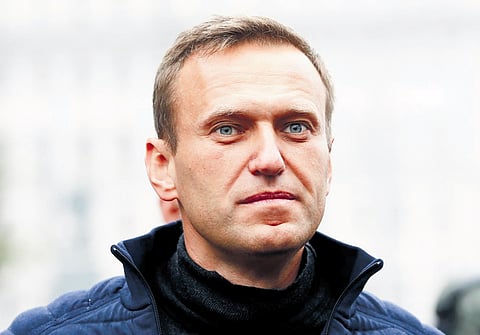'Patriot' book review: A vivid, layered portrait of Russia’s most prominent opposition figure
Patriot, Alexei Navalny’s memoir, offers a vivid, layered portrait of Russia’s most prominent opposition figure, detailing a life marked by activism and unyielding hope for a better future. Written before his death, Navalny’s memoir unfolds as both a personal narrative and a political manifesto, tracing his path from a Soviet-era childhood to his fearless battle against the Kremlin, culminating in his imprisonment, and eventual death.
Navalny opens his memoir with a chilling recount of his 2020 poisoning. On a flight from Siberia, he feels his body shutting down, realising he has been poisoned. Even in such dire circumstances, Navalny jokes about the inconvenience he caused the pilot and crew, displaying the dark humour that characterises much of Patriot.
He concludes the first chapter poignantly: “I have just enough time to think, It’s all lies, what they say about death. My whole life is not flashing before my eyes. The faces of those dearest to me do not appear. Neither do angels or a dazzling light. I am dying looking at a wall.
The voices become indistinct, and the last words I hear are the woman shouting, ‘No, stay awake, stay awake.’ Then, I died. Spoiler alert: actually, I didn’t.” This near-death experience became a defining moment in Navalny’s life, solidifying his commitment to expose corruption and demand transparency within Russia’s leadership.
Reading these lines, only months after Navalny’s death in February 2024, while serving a sentence in a Siberian penal colony, instils a deep sense of unease. His untimely death has sparked global controversy, with accusations of foul play, and the exact cause remains murky and unresolved.
Patriot establishes that Navalny’s legacy is evident in his ability to confront Putin’s regime with satire, even from prison. He compares his life behind bars to Putin’s luxurious lifestyle, noting with irony that while both live behind walls, only one has the privileges of wealth and comfort.
In March 2024, following his re-election, Russian President Vladimir Putin addressed Navalny’s death in a press conference, calling it an “unfortunate incident”, adding, “That’s life.” Putin also revealed that he had been willing to release Navalny in a prisoner exchange with Western countries, provided Navalny would not return to Russia.
Navalny’s resilience stands at the heart of Patriot, not just in his physical endurance, but also in his response to endless intimidation and surveillance. Arrested upon his return to Russia, he faced continual persecution. Even in prison, Navalny describes his harsh surroundings with wit, often using humour and new-age lingo, to lighten the grim reality. He recalls encounters with government-paid hecklers and absurd bureaucratic cycles where minor infractions resulted in solitary confinement.
Navalny’s self-awareness is prominent throughout the book, especially when he reflects on the Soviet legacy that influenced his early worldview. Raised in a small town within a military family, he was exposed to both the ideals and contradictions of Soviet life.
Visits to his grandmother in Ukraine after the Chernobyl disaster were particularly formative; the Soviet government’s attempt to obscure the catastrophe fostered a profound distrust in authority that later fuelled his anti-corruption pursuits.
Navalny’s memoir also traverses his political evolution and diverse ideological influences. By 2017, he had embraced progressive ideals, even supporting same-sex marriage; a rare and risky stance in conservative Russia. His investigative videos exposing corruption amassed millions of views, establishing him as a charismatic and unfiltered political leader connected to a younger, internet-savvy audience.
In recent interviews, Navalny’s wife, Yulia Navalnaya, has spoken about his unyielding optimism even in grim conditions, sharing anecdotes from his time in prison. In one visit, Navalny confided his fear that if the regime weakened, they would eliminate him to prevent destabilisation. Yulia’s resilience and devotion are woven into Patriot, making her a central figure in the narrative, as she advocates for independent Russian voices and meets with global leaders to seek change.
Patriot outlines a plan for Russia’s future, advocating an end to war, the institution of free elections, and an independent judiciary. Although the book deeply resonates only with those interested in Russian history and politics, Navalny’s unresolved death and the serious accusations against Putin will likely captivate international readers as well.
However, recent political shifts, including the Trump victory in the 2024 US Presidential elections, which suggests Moscow may benefit from a strengthened stance, add layers of complexity to Navalny’s call to action. The anticipated geopolitical alignment in favour of Putin creates a sense of uncertainty for readers, casting Navalny’s vision for Russia in a more precarious light.
In conclusion, Patriot transcends its form as a memoir, evolving into a profound meditation on resilience, courage and the pursuit of truth against incredible odds. Navalny’s words inspire those who dream of a Russia free from corruption and authoritarian rule, leaving behind a blueprint for defiance against oppression.

